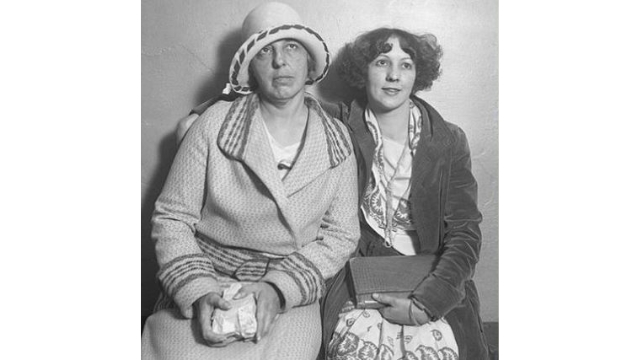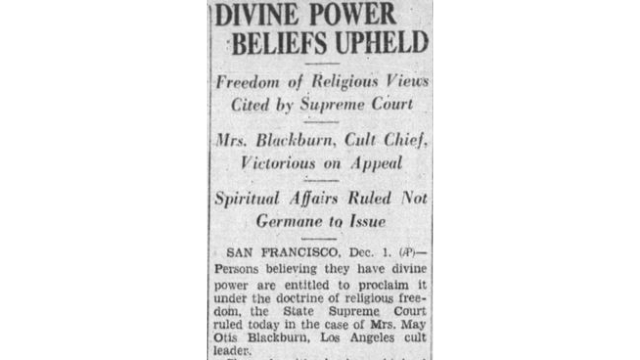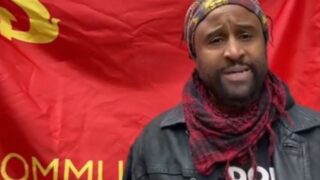In 1931, in the landmark case “People v. Blackburn,” the Supreme Court of California stated that claiming an inspired religious knowledge and collecting donations even for a marginal religious movement is part of religious liberty.
by Massimo Introvigne
Article 3 of 4. Read article 1 and article 2.


As we have seen, the new Japanese law prohibits donations based on promises by “inspired” teachers and “fear” of imaginary misfortunes. I have argued in the previous article that such vague wording threatens all religions, because promises of enlightenment or of a better afterlife by definition cannot be empirically verified.
A Japanese anti-cultist may object that one thing are promises made by “serious” religions and another are promises made by “cults” such as the Unification Church. However, secular courts are not competent to distinguish between “good” and “bad” religions, and religious liberty is only as good as is the protection it offers even to the most marginal and unpopular groups.
I may quote several legal precedents illustrating this point, particularly in the United States, but I will focus here in “People v. Blackburn,” a 1931 decision by the Supreme Court of California that has been often quoted in subsequent American cases. As you will see, the case is somewhat extreme. This is the very reason I chose it. It demonstrates that religious liberty is truly protected only if donations even to the most marginal and “strange” religions are protected.
The case was about The Divine Order of the Royal Arms of the Great Eleven. Known in short as The Great Eleven, it was a Los Angeles new religious movement founded in 1922 by May Otis Blackburn.
Blackburn was born in Storm Lake, Iowa, but started gathering followers of her numerological speculations about the Bible and the universe in Portland, Oregon, before moving to California in 1918. There, May taught that she and her daughter Ruth were the Two Witnesses mentioned in the Book of Revelation, and were receiving revelations from Gabriel and other angels. Gabriel had ordered that the revelations should soon be collected in a book. Not only would the book offer a new interpretation of the Bible and reveal hitherto unknown secrets on the origins and destiny of the universe; the publication itself would trigger apocalyptic events, leading to the millennial reign of eleven God-appointed queens, who would have their palaces in Hollywood and include May and her daughter.
The legal story of the Great Eleven started with a complaint against Blackburn filed by a nephew of the oil magnate Joseph Benjamin Dabney, called Clifford Richard Dabney. The younger Dabney was a disgruntled ex-member of The Great Eleven, and claimed he had been fraudulently persuaded to donate significant sums of money, together with shares of oil companies and land, to support the movement and the publication of the famous angelic book, which was never published. He claimed that the heavy donations, together with disagreements with his uncle, had almost bankrupt him. Blackburn was arrested, prosecuted, and convicted of grand theft by the Superior Court of Los Angeles County on March 2, 1930.


The jury had also heard damning testimonies about a Great Eleven couple that had kept their deceased young daughter mummified at various locations rather than burying her, hoping she would soon resurrect, and even the possible homicide of Ruth Blackburn’s abusive husband, who had disappeared.
In their decision of November 30, 1931, confirming the opinion of the District Court of Appeal of California, Second District, Division One, which on March 23, 1931, had already overcome the Superior Court decision, the California Justices severely chastised the prosecutor for having introduced in the 1930 trial evidence about these cases, with the obvious intent of prejudicing the jurors by exposing them to matters that had nothing to do with the donation case.
Note that the Justices had no sympathy for The Great Eleven. In fact, they wrote that the movement’s “whole plan of life and salvation is a babel of incoherency abounding in absurdities of an extreme type and the wonder is that rational minds should have become obsessed by such chimerical delusions.”
However, the Supreme Court noted that while it would be illegal to use such delusions to prey on the mentally weak, “In the instant case no claim is made of a weakening of mentality on the part of those who accepted the defendant in the role she manifested herself,” including Clifford R. Dabney, who while he was a member of The Great Eleven was perfectly capable of functioning as a businessman and donated willingly.
The Supreme Court concluded that Dabney and others had accepted a strange interpretation of the Scriptures but, being mentally competent, they had done it freely. According to the Justices, from Dabney’s point of view at the moment he made the donations, his choice was rational because he believed he could expect a bright future in this life and the next, and “the paltry dollars which he had expended (…) were as trifles compared with [the] priceless gifts” he hoped to acquire.
While not resisting the temptation to pass judgement on The Great Eleven’s doctrines as “absurdities,” the Supreme Court of California ultimately came to a strong statement of religious liberty and the principle that secular judges were forbidden to investigate whether Blackburn was really talking with angels and receiving revelations, and was in a position to guarantee a glorious millennial destiny to her followers, including Dabney.


The Supreme Court of California wrote that, “Any legislative attempt to limit or regulate persons in their claims to the possession of exceptional spiritual power or knowledge would be rejected as a dangerous invasion of the state into the realm of religious freedom and privilege, which, from the beginning of our government, has been guarded by constitutional barriers (…) This power in the instant case, according to the prosecution’s evidence, was claimed by defendant to be derived from God agreeable with His written word as recorded in Holy Scripture. That book is an open record and all who will may solve for themselves the extent or degree of divine power that mortals may hope to attain. Each person is at liberty to interpret it for himself.”
Dabney did not get his money back, and May Blackburn was allowed to continue with The Great Eleven until her death in 1951, although it always remained a small movement.
“People v. Blackburn” appears thus as an early decision where claims by apostate ex-members (i.e., those former members of a religious group who have become it militant opponents), hints that something that decades later will be called “brainwashing” was at work, and sensational claims by the media were treated with a healthy skepticism by the Supreme Court of California. Its Justices reiterated the principle that professing and soliciting donations on the basis of unpopular beliefs is not a crime.
As the Court of Appeal had already stated, “It matters not how absurd the faith of the defendant and her followers may seem to be (…) Defendant had the same right to organize a society based upon that faith, that her followers had to join with her in creating the society and establishing the community, provided only that they did not conspire together for some purpose prohibited by law. And if for the purposes of such society they chose to invest their money, that was no crime against the state.”
There are more recent decisions, but all was already said there in 1931. Just as the Japanese law says, some religionists claim to possess a “knowledge based on inspiration or other special abilities that are difficult to demonstrate reasonably,” and based on this ask their followers to donate. The Supreme Court of California stated that “any legislative attempt to limit or regulate persons in their claims to the possession of exceptional spiritual power or knowledge” and their freedom to solicit donations should be “rejected as a dangerous invasion of the state into the realm of religious freedom.” This “dangerous invasion” is precisely what is now happening in Japan.









